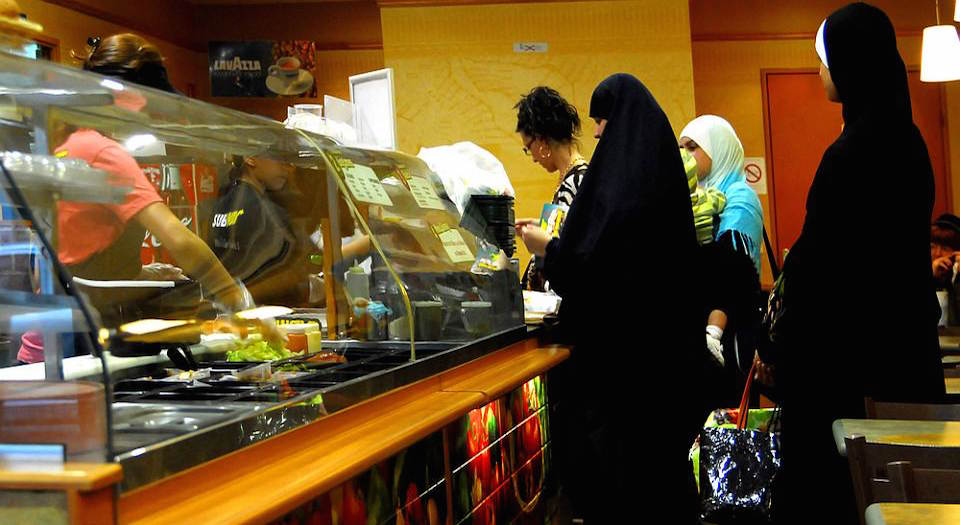After Paris: the myth of Islamophobia
Fear of rampant anti-Muslim sentiment is really a fear of the people.

The deaths were still being tolled, the casualties still being taken to hospital. But while the rest of the world was coming to terms with the Paris attacks, those keen to see anti-Muslim prejudice and bigotry everywhere just couldn’t help themselves. Out the familiar lines came: ‘demagogues [will] immediately blame it on Muslims’; ‘terrorist attacks in Paris are going to trigger more anti-Muslim sentiments in Europe’; ‘a field day for Islamophobes’; and, from the UK, ‘too often the response to such attacks is to hold responsible and scapegoat all Muslims’.
That so many commentators and MuslimsAreNotTerrorist hashtaggers were quick to dust off this tale of rampant anti-Muslim feeling just waiting to explode shouldn’t have been a surprise. We first heard of the rising tide of so-called Islamophobia in the mid-to-late 1990s, as the ascendant ethos of multiculturalism generated aspirations to victimhood among assorted cultural and ethnic groupings. And then, after every Islamist atrocity on Western soil, the same story has been trotted out: the Muslims will now get it in the neck. New York in 2001, Madrid in 2004, London in 2005, Toulouse in 2012, Paris earlier this year… the actual event made no difference to the tellers’ tale: a backlash against Muslims was always just around the corner.
And yet the backlash, Islam’s night and no doubt day of broken glass, never arrives. There never is an anti-Muslim pogrom. There never is a mass eruption of spitting, niqab-renting hatred. Some nasty graffiti and unpleasant tweets, yes; perhaps, lamentably, a fire at a mosque; and even the odd, isolated physical attack on a Muslim for no other reason than the fact he or she is a Muslim. But the actual anti-Muslim backlash, the actual fulfilment of Islamophobia proponents’ wet nightmares, the actual mass assault on each and every Muslim… it continues to lack reality.
But what Islamophobia doesn’t lack is a constituency willing to believe in its reality, willing to perceive a rising tide of anti-Muslim feeling. This conviction that Islamophobia is always on the march, especially after a terrorist atrocity, is not born of social fact, despite the inflated claims of advocacy groups like Tell Mama in the UK and the Collectif Contre L’Islamophobie en France, which have a vested interest in constructing a mass Islamophobic sentiment from an assortment of rude tweets, unverifiable claims, and the odd reported incident. No, it’s born of fear, a fear of the masses, a fear of the natives. A fear, that is, of how people think (irrationally), and how they might respond to a terrorist provocation (instinctively and destructively). Ironically, then, Islamophobia is itself an elite fear: a masses-phobia, born of the political and media class’s estrangement from vast swathes of civil society. It speaks of a profound social disconnect, a chasm between the ruling elite, and those who share its outlook, and the rest of society.
You can sense this masses-phobia in the hyperventilation about how the Paris attacks will benefit the right-wing, anti-immigrant Front National. ‘[Marine] Le Pen’s extreme-right movement was France’s second-largest party. Now it may become the first’, notes one columnist; ‘Friday night’s events [are] likely to play into the hands of the far right’, reports another. All this sounds like political analysis. But, peer a little closer, and these sentences betray the established elite’s fear of the people; they appear as a frightening mass which, just like that, will rally behind the likes of Marine Le Pen and other assorted far-right groups.
Islamophobia, this pre-emptive diagnosis of an anti-Muslim pathology afflicting the masses, not only speaks of the authorities’ fear of the masses; it disciplines the masses, too. It is a prohibition, a ban on a certain way of thinking. It says: do not judge the Islamist worldview; do not criticise another’s faith. As Brendan O’Neill has argued, Islamophobia, this ‘multicultural conceit’, acts as a ban on judgement, a ban on criticising one set of beliefs and values, and asserting the superiority of another set. It prevents people, unless they want to be charged with being an Islamophobe, a perpetrator of a hate crime, from questioning, interrogating and judging the beliefs and values of those who kill in the name, yes, of Islam.
And, as such, there is a cowardice at the heart of this multicultural conceit, a fear of exercising judgement, perhaps even an inability to exercise judgement, and to assert the value and superiority of Western society and the enlightened principles on which it is based. Because, in part, for those deploying Islamophobia as a PC prohibition, they fear the response of those to be judged. They fear a further stirring up of the Islamist storm to come. They fear the backlash. That’s why those arguing against so-called Islamophobia claim that the Islamic State and its imitators want Western societies to become more judgemental, more ‘intolerant’. As one politico warns, ‘the more Muslims are persecuted, the more Muslims will be motivated to pick up arms and fight in Western Europe’, while another says IS wants to eliminate the ‘Western acceptance of Muslims’.
But to be critical of Islamism, to be critical of the beliefs and principles of those determined to destroy the ‘camp of kufr’, and to start asserting and defending the values still manifest in Western society, has nothing to do with persecuting Muslims, or rendering Islam unacceptable. That too many think it does, that too many confuse judgement with intolerance, shows the extent to which the West is already defeating itself.
Tim Black is books and essays editor at spiked.
To enquire about republishing spiked’s content, a right to reply or to request a correction, please contact the managing editor, Viv Regan.









Comments
Want to join the conversation?
Only spiked supporters and patrons, who donate regularly to us, can comment on our articles.